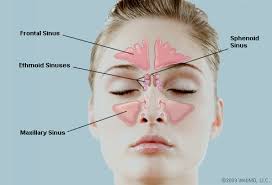sinus
英 [ˈsaɪ.nəs]
美 [ˈsaɪ.nəs]
- n. [生物] 窦;静脉窦;下陷或凹下去的地方
使用频率:

中文词源
sinus 鼻窦,窦道
来自拉丁语 sinus,弯,曲,转,后用于解剖学术语指鼻窦,窦道等。
英语词源
- sinus
-
sinus: see sine
- sinus (n.)
- "hollow curve or cavity in the body," early 15c., from Medieval Latin sinus, from Latin sinus "bend, fold, curve, a bent surface; a bay, bight, gulf; a fold in land;" also "fold of the toga about the breast," hence "bosom," and figuratively "love, affection, intimacy; interior, inmost part;" of unknown origin.
权威例句
- 1. I still suffer from catarrh and sinus problems.
- 我仍然患有黏膜炎和鼻窦炎。
- 2. Sinus arrhythmia also tends to disappear with advancing age.
- 随着年龄的增长,窦性心律不齐也趋于消失.
- 3. This normal variation in rhythm is known as sinus arrhythmia.
- 节律的这种正常变化称为窦性心律失常.
- 4. Sinus bradycardia occurs when the heart rate falls below 60.
- 窦性心动过缓是心率低于60次.
- 5. Reversion to sinus rhythm , by means of electrical countershock , is indicated.
- 可用电除颤使恢复窦性 节律 .